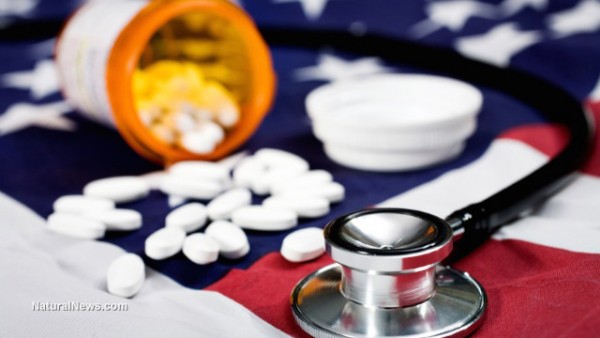1 in 10 Americans prescribed antidepressants that eliminate free will
12/01/2015 / By Julie Wilson

Twentieth century civilization is far more drugged up than ever before — and it’s not illegal drugs that have taken over society. Nowadays, man-made prescription drugs that have made the pharmaceutical industry filthy rich are being widely administered among the populace.
An estimated one out of 10 Americans is on some type of antidepressant drug – a frightening revelation considering the damage they cause to the body and mind. Research shows that antidepressants or psychotropic drugs (chemical substances that alter brain chemistry) often cause the symptoms they’re intended to alleviate, including aggression, physical assault and suicidal and homicidal behavior.
The behavioral changes caused by these drugs are not to be taken lightly, as they often work as a switch, sometimes resulting in extreme bursts of anger and violence. Nearly every perpetrator of mass school shootings has been on some type of psychotropic drug.
Author Jim Marrs wrote in his book Population Control: How Corporate Owners are Killing Us:
“There are about twenty-five million Americans on SSRI [class of psychotropic] drugs. If only one-tenth of one percent act violently to the drugs, that’s still twenty-five thousand potential mass murderers.”
Very young children are fastest growing group on antidepressants
Even more concerning is that children under five years old are the fastest growing group being prescribed mind-altering drugs. Studies show antidepressants prescribed to children and adolescents may increase suicidal thoughts, prompting the U.S. Federal Drug Administration (FDA) to force pharmaceutical companies to add “black box” warnings to the drugs in 2004.

The labels warn antidepressants may cause suicidal thoughts among children and adolescents.
Children as young as four years old have attempted suicide, while kids as young as five have been successful at it, reports Fight for Kids, adding that “Between 1995 and 1999, antidepressant use increased 580% in the under 6 population and 151% in the 7-12 age group.”
The FDA later added a second warning, stating the risks apply to adults, too.
Psychotropic drugs crush free will
One of the reasons widespread use of antidepressants is so controversial is that these drugs actually have the ability to eliminate free will, as described best by Peter R. Breggin, MD, in his book titled Medication Madness: A Psychiatrist Exposes the Dangers of Mood-Altering Medications:
“The capacity of drugs to modify feelings and even behavior challenges concepts and values that many of us cherish, including free will, rationality, personal responsibility, and self-determination.
“While different people will react in different ways to the same psychiatric drug, one fact remains incontrovertible: In double-blind controlled clinical trials where patients and observers are kept in the dark about who is getting a psychiatric drug and who is getting an inactive sugar pill, individuals receiving the psychiatric drug will experience more frequent and intense emotional and behavioral disturbances than the same or similar individuals given a sugar pill [emphasis added].
“Even when these drugs are given to ‘normal volunteers,’ they will experience the same kinds of adverse emotional reactions as patients with psychiatric diagnoses. Put simply, psychiatric drugs are proven to cause bizarre, unwanted, and dangerous mental states [emphasis added].
“In addition, we shall find that many psychiatric drugs produce apathy and indifference, greatly impairing the capacity to make choices and to take actions of any kind.
“As examples, stimulants given to children often reduce all spontaneous behavior, and the antipsychotic drugs given to children and to adults can utterly crush free will.
“These scientific facts should not be surprising. Free will and rational-choice making require an intact brain, and psychiatric drugs, one and all, always cause brain dysfunction. That’s how they work.”
Sources:
Submit a correction >>
Tagged Under:
Antidepressants, Child abuse, free will, mass shootings, psychotropic drugs
This article may contain statements that reflect the opinion of the author





















